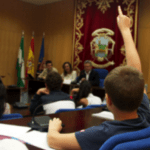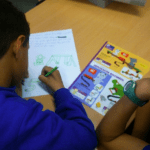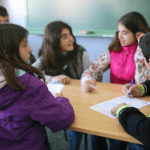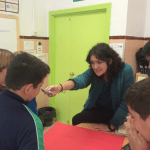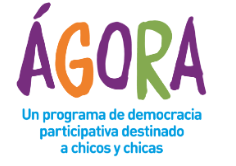
Agora Infantil
Description
Agora Infantil is a child and youth participation program in Andalucía, promoted by Coglobal and supported by the University of Málaga, University of Huelva, University of Cádiz and the Università Degli Studi di Palermo. It is intended to be an instrument that enables the participation of the youngest in the building, use or management of public spaces from the perspective of childhood and adolescence. The program tries to construct classrooms that are decision-making spaces in which children and adolescents analyze their territory, make proposals, deliberate and build collective proposals that the local council can put into action. Implementation of the program was proposed by local government in collaboration with schools.
Agora Infantil is an experimental program that has been active in 11 Andalusian towns: Archidona, Ardales, El Burgo, Casabermeja, Casares, Puente Genil and Trigueros (the first towns to implement the program in academic year 2014-2015); followed by Almáchar, Huelva, Lucena and Riogordo. These towns have varying profiles, ranging from the smallest and most rural—El Burgo and Almáchar (1900 inhabitants each)—to medium-sized towns and cities such as Puente Genil (30 000), Lucena (43 000) or Huelva (146,000), the capital of the province of the same name.
Preparation
Participants chose to intervene in classrooms and during school hours because of their special interest in observing whether implementing the program generates democratic inclusion in those target sectors of the under-age population that are prone not to participate. The classroom serves as a random, representative sample of the population. Working with the whole class is extremely valuable as it facilitates observation and validation of the methodology used. These interventions have served as a beta test, as they do not represent all girls, boys and adolescents in the territory. New interventions that connect participatory processes in classrooms with forums at the more representative territorial level constitute the next step in the project.
Implementation
hrough Agora Infantil, direct municipal-democracy interventions are carried out with children and adolescents from 10 to 14 years who want to get involved in the exercise of decision-making about issues that affect and interest them. These cover leisure and culture programs, equipment for children and youth, awareness campaigns on environmental issues, coexistence, etc. The program is constructed so that school classrooms are a space for deliberation and decision-making in which participants analyze their territory, identify needs, debate ideas and build a proposal that will later be implemented by local government.
The initiative is carried out as follows:
- First session: getting to know each other. On the first day of work with children and adolescents, the project, schedule and methodology are presented. A representative of the local council attends and reports back on the initiative and its scope. This person informs participants that their proposals need to be technically and economically feasible. The students also need to conduct some research into the subject they intend to work on in their family and social environment.
- Second session: Out in the field. The girls and boys visit the place where the topic to be addressed can be implemented (the local culture center, if it is a cultural agenda, a park that needs to be redesigned, or wherever). Local authority technical staff participate in these sessions in order to introduce students to the subject, how it is managed, and to show them the steps to follow in the design and implementation of the activity to be decided on.
- Third session: Proposals. Children and adolescents brainstorm proposals Groups are formed and select the proposals that most appeal to them. The proposals selected by the different groups will be transferred to local government to study their feasibility.
- Forth Session: From Imagination to Action Local authority technical staff participate on behalf of the local government and report on the feasibility of the proposals put forward in the previous session. This is the moment to select which of the preselected viable proposals will finally be implemented. Students are involved in defending proposals other than those they themselves have put together (cross defense), creating an exercise in inter-group empathy. Finally, proposals are selected and prioritized.
- Fifth session: The Children's Plenary The local government team gives space to the participants who stage the approval of the proposed initiative. Local council representatives attend the event and express their commitment to complying with the agreement. This plenary session is open and public and the entire school community (teachers, family and wider community) is invited.
Ways of engaging young people
oys and girls brainstorm proposals. Groups are formed and select the proposals that most appeal to them. The proposals selected by the different groups will be transferred to local government to study their feasibility. Students approve the proposals.
Role of young people
- Participants
Positive aspects of the project/process
Valuable learning derives from observation of Agora Infantil sessions. Much of this is a related to unbalanced reactions in girl-boy dynamics or the role of leadership in the class. These gendered elements need to be actively addressed by the facilitators to encourage contributions and foster the creativity of all the individuals that make up the group. Subsequent improvements that have been incorporated into the intervention design as a result of classroom observations include:
- Small-group work is recommended
- Incorporate anonymous proposals to eliminate any potential prejudice related the people who propose them
- Prioritize play for inter-relationships and as a source of joy, making this the dominant emotion in the group
- Encourage the team to stimulate reflection on stereotypes and on the social value of participation.
In a short period, Agora Infantil has helped generate processes of active, participatory involvement among Andalusian schoolchildren. Students responded positively, increasing their empowerment in the context of the local public sphere. In some towns and villages, the girls and boys participating in the program are beginning to collaborate with pre-existing local youth participation structures, giving continuity to the results sought in the intervention. We have reason to believe that continued development of the program within a given territory could favor the formation of a stronger community-based, participatory citizen culture. Coglobal expects to be able to verify this in the coming years so the implementation of Agora Infantil and its evaluation continue.
Beneficiaries of the participatory process are:
- 224 boys and girls between 10 and 14 years old (the final 2 years at primary school and the first 2 years at secondary school)
- 15 teachers and 12 municipal technicians and elected officers.
Indirect beneficiaries are, to some extent, the school population of the 10 centers where the action has been carried out. Indirect benefits are also generated in the seven municipalities because of the innovative experience, knowledge of which is transferred to the local administration, and by the local population as a whole, through the action proposals emanating from the project and the social awareness derived from the activity.
Main obstacles to the project/process
To better transfer practice, special attention should be paid to issues such as:
- Small-group work
- Sessions need to allow sufficient time for things to evolve adequately
- Involvement in the activity is greater in the first hour than in the last given that participants get tired over the course of the day
- Activity must be coordinated with the local council and the school center to set a common objective for the intervention
- It is important to adapt the space so that it is suitable for participative methodologies
- Specific measures should be incorporated to increase the level of participation of girls who, in general, participate less than boys This issue is especially important both because of the need to advance gender equality and because of the girls evidently greater sensitivity towards social media and group cohesion
- Implement techniques that improve the level of participation of the least integrated persons
- Seek the active presence of teachers, as this can ensure the continuity of the intervention from session to session
- Strengthen the argumentation in the methodology since it facilitates decision making
- Extend the number of sessions since a notable improvement is detected during the sessions, in capacity for argumentation, self-confidence, and in increasing solidarity and cutting down on individualistic measures.
Opinion after implementation
The evaluation was carried out using a quasi-experimental design in which measurements were made before and after the intervention in both the target group and the control group. The instrument used was a questionnaire with closed and open questions designed for this purpose. Along with quantitative measurement, narrative observation has been recorded. In this case, at the end of each session, each of the members of the field team separately described what happened during the session to later prepare a joint final report. The objective of the observation, in addition to finding possible results for the intervention, has been to identify which aspects need to be improved and which maintained in the work methodology.
The quantitative evaluation of the first twelve experiences of Agora Infantil in academic year 2014-15 shows better data among the participating boys and girls in aspects such as (1) perception of self-efficacy, (2) perception of feeling listened to and taken into account, (3) confidence shown in the local council, (4) levels of knowledge about local politics. The improvements refer to the data recorded in the participating group before and after the intervention and to the comparison of these data with those recorded in similar groups that had not participated in the process. On the other hand, the level of girls’ and boys’ satisfaction with the intervention is very high.
In the satisfaction questionnaires, adults involved in the program (teachers and local authorities) also scored the project highly and considered that it allows municipalities and schools to gain in sensitivity and practice child and youth participation in investment and in activities directed at them.
The process of involving the youngest in the elaboration, debate, application and monitoring of PBs has the following benefits:
- Building a participation program for boys and girls
- Empowering the youngest through the collective construction of a specific initiative for the municipality
- Stimulating learning from practical experience, and
- Bringing municipal administration closer to the youth.
Accountability of resources
Coglobal coordinates the program and the Coglobal team designs and shapes the interventions. The entity is in charge of meeting previous commitments with city councils, schools, the social environment and research teams. During the sessions with children and adolescents, the Coglobal team also leads the interaction between participating groups.
The program has the support of research teams from the University of Málaga and the University of Huelva, which participated in the study and evaluation process of the experience.
The program is implemented at the request of local government (council) with the collaboration of the schools (which are the responsibility of the regional government of Andalusia). Both teachers, technical personnel, and local council politicians participated in the whole process.
1-3 tips (advices, warnings) from organizers or participants
- Raise awareness in schools and councils of the capacity of children and adolescents to express their opinions and decide on their agendas
- Work together with municipal government and other local authorities to put into practice the solutions proposed in favor of the rights of children and adolescents
- One of the biggest problems to be faced in terms of participation continues to be the ingrained mentality that adults do not consider children and adolescents as capable of having opinions and making decisions. This is a cultural problem that must be faced
Links to examples of application forms, voting styles, tools
| The participation of children and adolescents at municipal level: http://www.coglobal.es/wp-content/ uploads / 2017/02 / Participacion_infantojuvenil_2017-2.pdfagora |
| Children's: A participatory democracy project for boys and girls. http://www.agorainfantil.com/wp-content/uploads/2019/07/dossier_%C3%81gora-Infantil-2019_20-1.pdf |
| Quantitative evaluation (Agora Infantil 2014-2015): http: //www.agorainfantil .com / free-access-to-report-of-evaluation-quantitative-agora-child-2014-2015 / |
| Coglobal Publications: http://www.coglobal.es/actualidad/ |
| “Minuto Experto 22” - Methodology of participation in childhood. Agora Infantil Project: https://youtu.be/ANKdLJ_UZnI |
